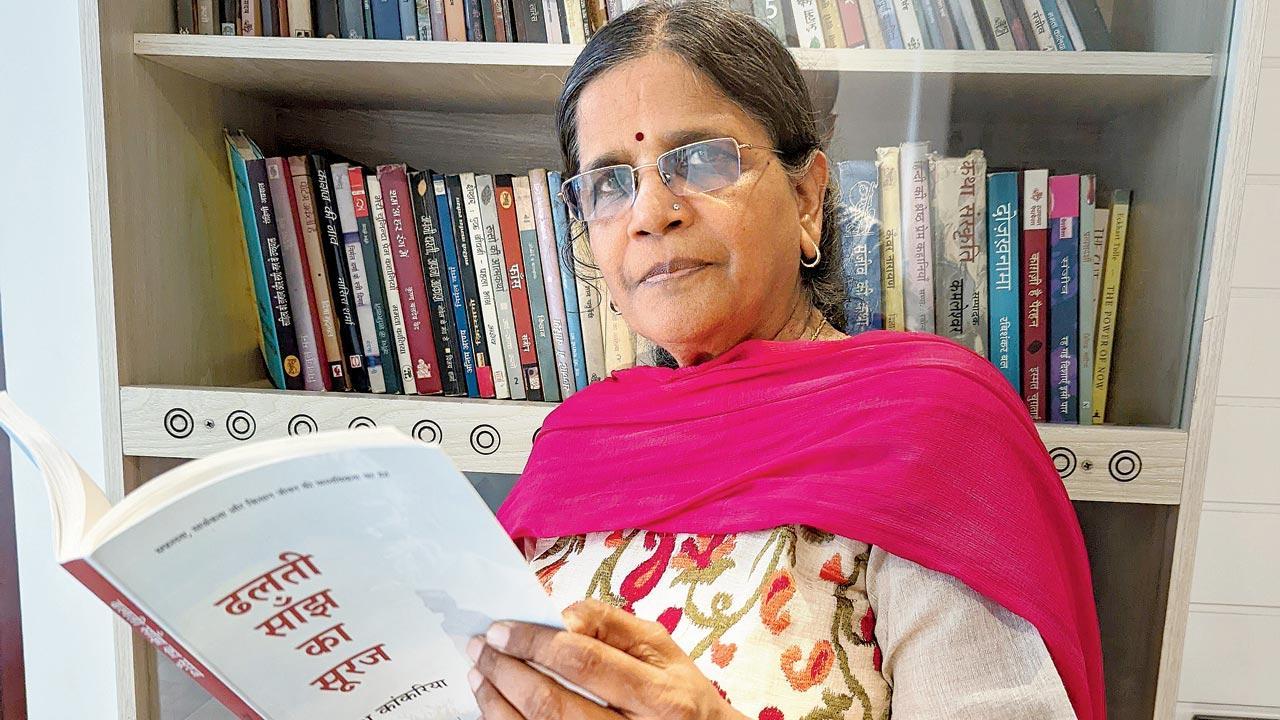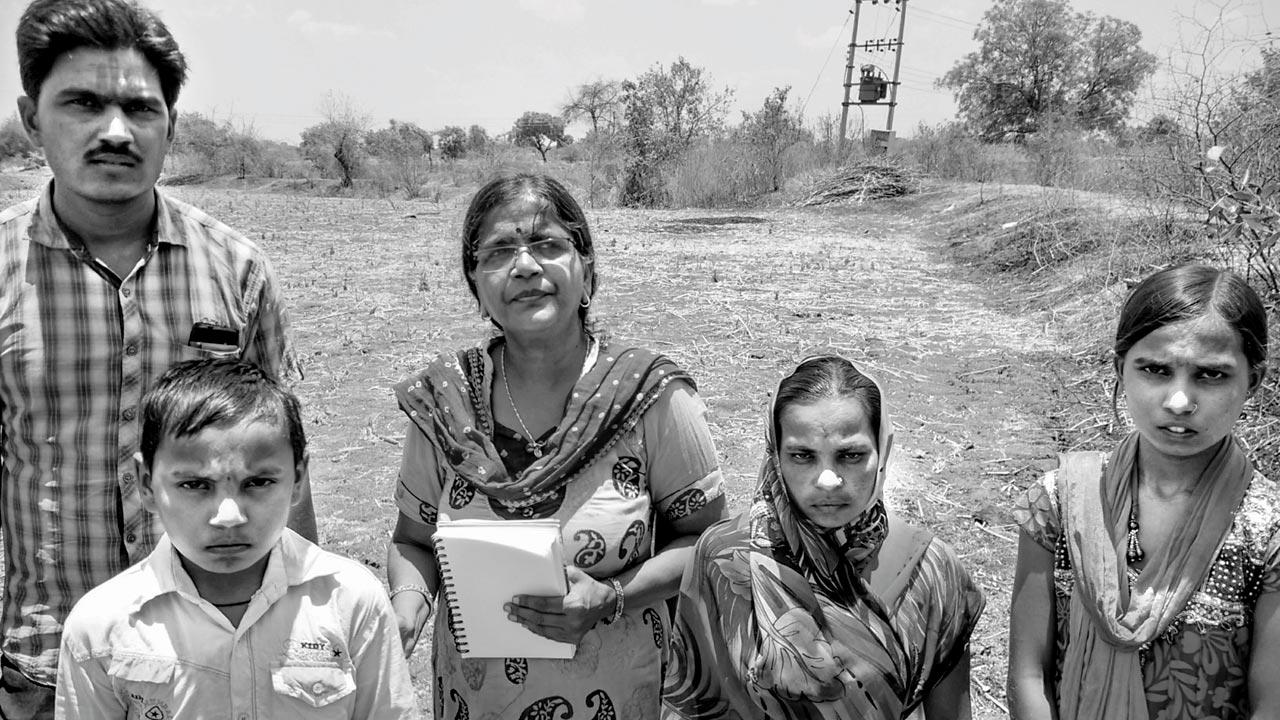A renowned Hindi writer’s unplanned visit to an agrarian heartland in 2016 has given birth to a reportage-driven novel on farmers’ suicides in Maharashtra

Madhu Kankaria
 Madhu Kankaria’s new Hindi novel Dhalti Sanjh Ka Suraj follows two journeys. First, the protagonist of the novel takes on an arduous journey to meet his mother and understand his motherland. The journey is akin to the writer’s own effort to reach out to Maharashtra’s suicide-prone farmers and understand India’s agrarian crisis.
Madhu Kankaria’s new Hindi novel Dhalti Sanjh Ka Suraj follows two journeys. First, the protagonist of the novel takes on an arduous journey to meet his mother and understand his motherland. The journey is akin to the writer’s own effort to reach out to Maharashtra’s suicide-prone farmers and understand India’s agrarian crisis.
This columnist recently read Kankaria’s much-acclaimed rebellious Sej Par Sanskrit, a courageous novel against the induction of Jain Bal Sadhvis into a life of extreme frugality and repression. Very few contemporary Indian writers have opposed religious dogma and duplicity in the razor-sharp incisive style that Kankaria has dared to. In fact, her Marathi translator Vasudha Sahasrabudde was fearful of extreme reactions from readers during the launch of the Marathi rendering. Kankaria, fearless as she is, was ready for any consequence that resulted from her writing. “As writers, we cannot curb our expression, merely due to the fear of a backlash. Any writing, whether explosive or not, whether critical or not, whether fictional or inspired by reality, is a creator’s journey, which has to continue against all odds,” says the 65-year-old author.
In Dhalti Sanjh Ka Suraj, Kankaria seems to be on a rather inward journey. Her motto is very clearly mentioned in the foreword. She wants to put the spotlight on India’s farmers. “When over three lakh farmers of Maharashtra choose death over life, that is news, big news! That is the story to be followed, not just in media, but on every possible literary platform too. I felt a peculiar urge to write on farmers’ suicides and below poverty line farmers’ families for a long time, which ultimately was addressed in 2016 when I visited Partur [in Jalna].”

Madhu Kankaria’s new novel, Dhalti Sanjh Ka Suraj, tells the story of a Switzerland-returned Indian who is troubled by the urban-rural contrasts in India. The book is based on her interactions with farmers’ families in Jalna
Six years ago, Kankaria’s son Aditya, and two young friends working in the private sector in Mumbai, decided to visit Jalna to partake in social work, funding civic infrastructure works for farmers of the state. They worked in close collaboration with non-governmental social trusts which aimed at rebuilding the lives of affected families and villages. Kankaria, who then lived with her son in Mumbai—both now live in Dhaka—was privy to the plan. She expressed her willingness to visit Jalna. The son and his friends discouraged her initially because the field visits involved a stay with the grief-struck families and also long walks to the farmlands under the scorching Marathwada sun.
Kankaria shrugged off the friendly warnings and accompanied the trio in the train and bus journey. She didn’t have much of a cultural connect with Maharashtra, nor had she done community work in the state; she was active in her own Kolkata-based NGO Lets Teach One. She had heard of the farmers’ plight in Vidarbha and Marathwada. For her, the newspaper reportage on the issues was unsettling. “I couldn’t possibly let go of an opportunity to go to these villages where I could talk to women, children, the sarpanch, the NGOs, government authorities, bank representatives, and all possible stakeholders.” It was a window she did not want to miss as a writer.
“Earlier, I had been deeply influenced by author-editor P Sainath’s focused reportage from the villages. I always felt the paucity of writers who put the torchlight on the Indian farmer,” says Kankaria. She was also driven towards Jalna by the words of actor Nana Patekar who, at one point, appealed to Mumbaikars to pay heed to beggars because they could be penurious farmers looking for options in the big city. “I am aware that Patekar is a maligned name in the social context, but in my case, his resounding words moved me towards Maharashtra.”
In 2016, Kankaria visited Jalna and Pune thrice. After every visit, her notes and interview excerpts deeply bothered her; she started looking for a medium to express the magnitude of the crisis. Before she set out to write the novel, she shared the experiences in three respectable Hindi magazines. The serialised reportage generated considerable curiosity, which ultimately crystallised in the novel published by Rajkamal Paperbacks.
Kankaria’s widely-acclaimed Sej Par Sanskrit is rooted in a monastic setting —an ashram in Azimganj (West Bengal), which prides itself on a strict Jain diet and even stricter behaviour norms. The author has first and second-hand experience of such Jain religious upasars and derasars. In fact, she drew flak from her community—extended Marwari family based in and around Kolkata—for her critical take on the glorification of deeksha rituals of adolescent sadhvis. She paints a raw undiluted picture of a monastery, which is sensitive to protection of microbial life-forms (in garlic, honey and figs), but is unmindful of the human suffering caused by denial of basic life experiences and joys.
Bleakness characterises Kankaria’s new novel too. A Switzerland-returned Indian’s rediscovery of India, particularly villages, raises existential questions about peace and satiety. The protagonist is troubled by the urban-rural contrasts in the new Shining India—banks offer incredibly low-interest loans to car/fridge buyers, even as subsistence farmers are slapped with an unfairly high-interest rate; wellness industry ads coexist with malnourished street dogs; real estate prices soar in the metros, while below poverty line villagers suffer due to lack of tar roads and well water. The novel presents a hero who is unable to reconcile contrasting realities and also is unsuccessful in finding peace in his personal situation. Despite material advancement, he is not at ease in Interlaken, the resort town where he lives in Switzerland, and is equally lost in his native land too.
Kankaria says her heart beats for Maharashtra’s farmers, and she would like to spend more time over here. She has forged lifelong relations with farmers’ families in Jalna, which go beyond her role as a novelist. Jalna provides her a magnifying lens to understand the economics of agriculture in India, especially the underappreciated labour in the farming sector, and the exploitative systems, which do not reward the cultivator. She sees a tragic significance in the setting sun.
Sumedha Raikar-Mhatre is a culture columnist in search of the sub-text. You can reach her at sumedha.raikar@mid-day.com
 Subscribe today by clicking the link and stay updated with the latest news!" Click here!
Subscribe today by clicking the link and stay updated with the latest news!" Click here!










